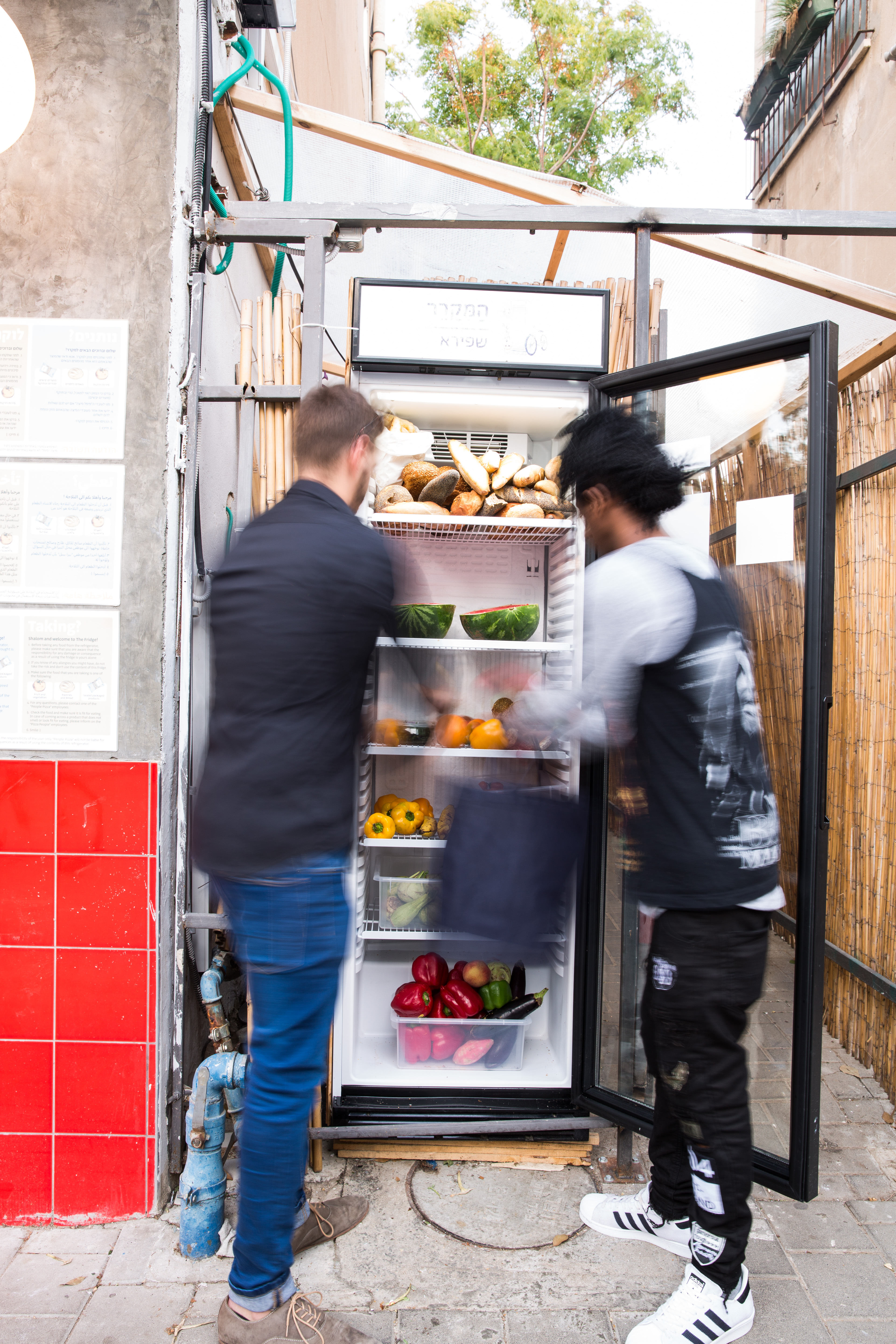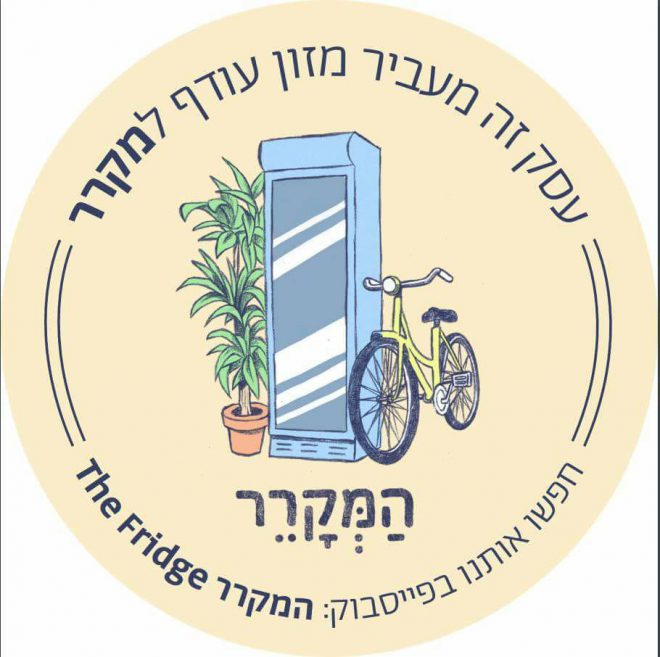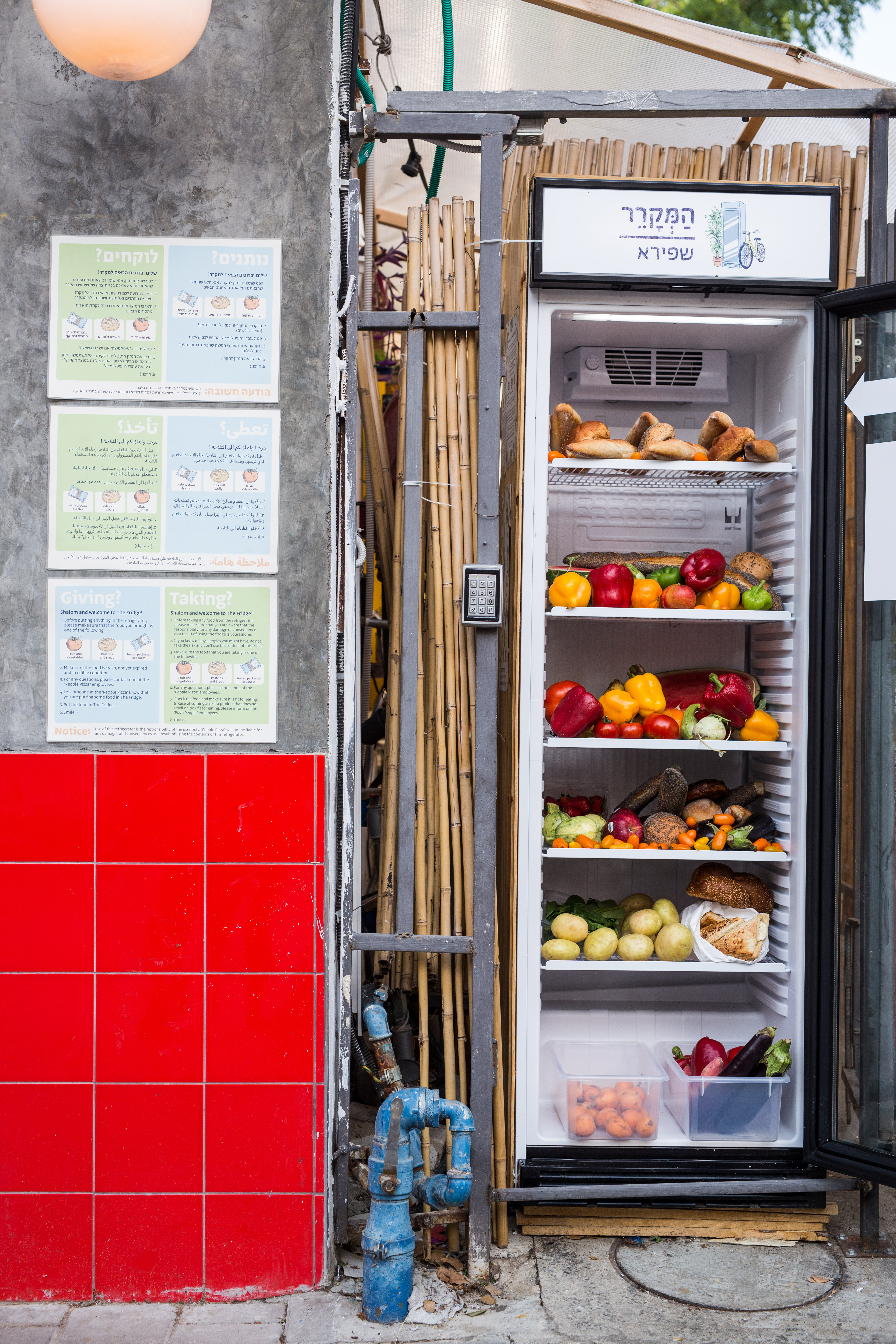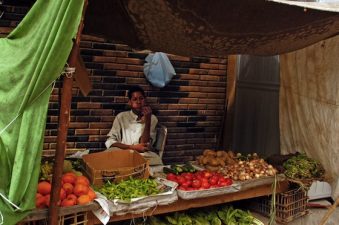There’s a refrigerator standing on a Tel Aviv sidewalk. It’s not an empty fridge waiting to be hauled away to a dump; it’s full of food. There might be a box full of tomatoes, eggplants and bell peppers starting to go soft. You could cook a good pasta primavera from that.
But you need the pasta. The grocery store behind the Fridge will have it . Take what you need from the Fridge, for free, and go inside the shop to buy your pasta. There. You’ve saved money, saved food from going to waste, and supported a neighborhood business, all in five minutes.

David Roubach, founder of the Fridge.
The Fridge is the brain child of two young businessmen whose goal is to raise awareness of food waste in Israel. Individuals like this anonymous Saudi Arabian have set up charity refrigerators, but The Fridge is a project that’s operating across a whole country.
On vacation from business school in 2017, David Roubach sat in a London cafe and observed people putting food into a sidewalk refrigerator, then others taking the food away. He discovered that there were at least 50 such charity refrigerators operating in England. Taking the idea back to Israel, he convinced his fellow student and good friend Omer Ronen to start a similar project. Together, they developed a larger concept: educating the public about food waste through community refrigerators.

We’ve reported on the global lack of food security and how half the world’s population goes hungry while the other half routinely wastes food. The definition of food waste, according to the Food and Agriculture Organization of the United Nations, is “All the food wasted even though it would have been good to eat.”
In household terms, that’s leftovers, or fruit past its best, or that package of quinoa drying up in the pantry. Leftovers can be reheated; soft apples can be baked in a pie, and that quinoa could make an excellent tabbouleh salad. Dumped into a landfill, the food will only make more methane greenhouse gas.
We may not feel it happening, but food waste also nibbles away at our personal income. Leket Israel, the National Food Bank, estimates that Israelis throw out 35% of the food they buy, mostly fruits and vegetables. Their 2018 report, focused on household consumption, states:
“…The volume of food loss in this sector amounted to 1,940 million pounds and a value of $2.2 billion. An average family in Israel throws away $890 a year, equivalent to a month and a half of food consumption, mainly due to the wasting of fruits and vegetables.”
The worst is that about half of food wasted was edible when it was dumped in the garbage. Maybe less than beautiful, maybe a bit bruised, but still edible.
With those facts, and fired by idealism, Roubach and Ronen created the Fridge project to reduce food waste. First, they haunted the open-air Carmel market in Tel Aviv to observe how surplus produce is wasted, especially on Friday afternoons , when vendors close up for the weekend.
“The vendors dump all the produce they couldn’t sell on the ground. City workers come and and clean it up and put it in garbage bins,” said Ronen.
https://www.facebook.com/thefridgeIL/videos/2321124328106657/
“We talked to the Tel Aviv municipality, about setting up a refrigerator for charity in the market, but they raised all kinds of objections: who would be responsible for it, what about security, how would insuring it work?”
The partners realized that they had to modify the plan and create an independent model based on neighborhood participation. The plan is relatively simple. If you have surplus food, donate it to The Fridge. If you’re short on cash or need to reduce the cost of your food shopping, take food from The Fridge. But it took two years to get the project running.
They researched solutions for anything that could go wrong. A microbiologist at Hadassah hospital set down strict rules about which foods may be donated and, and about hygiene in the Fridge. (Fresh produce, dry goods in closed packages and canned goods within the expiry date are allowed, as are commercial baked goods. Nothing home-made and no meat, fish, or dairy.) A top lawyer helped them blueprint the community-based model. They created a brand and a logo. They raised funds to support the Facebook page and to pay for printed materials.
Ronen explains, “It was a new idea, involving the community with the Fridge. We approached food-based businesses in the Shapiro neighborhood in Tel Aviv, and explained about food waste, how they can give away their surplus instead of throwing it away. We gave them a social sticker to put on their front window that reads, ‘This business supports the Fridge’. People take what they need from the Fridge. If it doesn’t have everything they need, they buy it from one of these businesses bearing the social sticker. This way, a cycle is created. Businesses contribute to the community, and the community contributes to them.”
A shop owner signs a contract agreeing to insure the Fridge as part of their business, to abide by the rules set down, and make sure it’s cleaned every day. This is “hosting” a Fridge. The Fridge itself bears printed instructions in Hebrew, Arabic and English taped to its door.
Today there are six Fridges in Israel, from the south in Beersheva to Kiryat Shmonah in the north, with new Fridges in the works in other locations. All Fridges are open 24/7.
The first Fridge was hosted by an eatery in the Shapiro neighborhood called Pizza People.
“We asked all our friends to bring something from their own homes to get it started,” recalls Ronen, “Any soft tomatoes,a bag of flour, stuff like that. About three months later we saw that neighborhood people were donating food, not only the shop owner or our friends. And people were taking food regularly.”
“We have two goals,” says Ronen. “One, to physically help prevent food waste, and even more importantly, to raise awareness of the issue. We’ve had a lot of media exposure through radio interviews, a TV program, podcasts and YouTube. The biggest draw is through our Facebook page. People get inspired and email us to ask how they can establish a Fridge in their own community.”
Most of those inquiries don’t result in a Fridge. A return email from the partners carries a 30-page attachment explaining how the project works. It might take as long as three months to start seeing results in a neighborhood. Although although Ronen and Roubach provide stickers, printed matter, and guidance, people hoping to set up a Fridge must talk to local businesses until they find one to host it, and deal with the legalities and paperwork on their own. It can be daunting, unless you’re fired up with idealistic enthusiasm.
“There are always obstacles, something that’s going to stop you,” says Ronen. “Just put the fridge on the sidewalk. Afterward you can deal with the lawyers and insurance; it’s going to be OK. You need meaning, and a purpose to help others, to help the world. That’s what keeps you going when times are rough.”
Each Fridge is supervised by a local volunteer and develops its own character, says Ronen.“In Tel Aviv, Pizza People mostly stocks the Fridge. In Beersheva, university students ensure that the Fridge is full. They take 20-minute shifts to go around the neighborhood, collecting food. We have a Fridge in a primary school in Misgav, a northern community. The second-graders saw the TV interview about the project and decided to set one up in their school, which they did, and it’s working. Even hi-tech businesses have approached us for help putting a Fridge in their offices. We think that’s great – even a mini-Fridge in an office helps raise awareness about food waste.”
Ironically, after the second Fridge was launched in Jerusalem’s Mahane Yehuda market, the Tel Aviv municipality approached the partners and asked to work together. Ronen didn’t comment on the results of that conversation, but told Green Prophet how a large organization proposed to expand the project’s reach.
“Six months after the launch, a gentleman, head of a big non-profit charity dealing with distributing surplus commercially cooked food, asked to meet with us. He told us, ‘Quit your jobs (because we were both working to support our studies), and let me help you. I’ll give you money to start a non-profit, and give you a salary. I’ll pay for the Fridges, the marketing, everything. All you have to do is make 200 such fridges in Israel. We have the money – just go and do it.’
“We were really in a dilemma. That would have helped us realize our goal. But something else would have happened: we would have lost the authenticity of each and every Fridge. The Fridges of Jerusalem, Tel Aviv, Misgav – each is owned by the community; no money is involved. That’s what makes the awareness so strong.
“So yes, other organizations are interested, but it’s best kept the way it is, because that way, the project comes from the inside of a community.” Ronen adds that another benefit is that the project strengthens social ties.
“I’m hoping that two years from now, I’ll take my girlfriend to Pizza People and we’ll have a beer and eat pizza, and we’ll watch people putting food in the fridge and taking food out. And I’ll tell her, we have 100 more like this with the same logo… that’s something we did. I’m looking forward to the time when I can chill and watch this whole amazing thing work completely alone.”

Interested in starting a Fridge in your neighborhood? Go to The Fridge on Facebook and ask.




